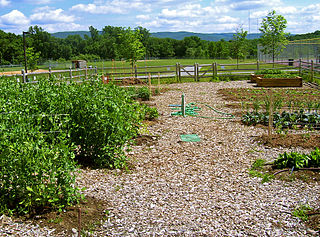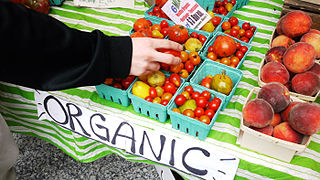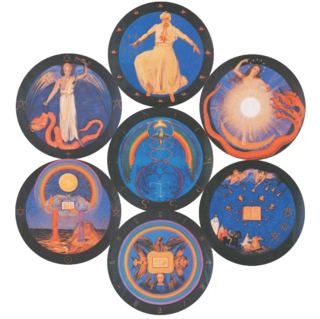
The following outline is provided as an overview of and topical guide to organic gardening and farming:

The organic movement broadly refers to the organizations and individuals involved worldwide in the promotion of organic farming and other organic products. It started around the first half of the 20th century, when modern large-scale agricultural practices began to appear.
The Soil Association is a charity based in the United Kingdom. Founded in 1946, it has over 27,000 members today. Its activities include campaign work on issues including opposition to intensive farming, support for local purchasing and public education on nutrition; as well the certification of organic food. It developed the world's first organic certification system in 1967 – standards which have since widened to encompass agriculture, aquaculture, ethical trade, food processing, forestry, health & beauty, horticulture and textiles. Today it certifies over 80% of organic produce in the UK.

Lady Evelyn Barbara Balfour, was a British farmer, educator, organic farming pioneer, and a founding figure in the organic movement. She was one of the first women to study agriculture at an English university, graduating from the institution now known as the University of Reading.

Sir Albert Howard CIE was an English botanist, an organic farming pioneer, and a principal figure in the early organic movement. He is considered by many in the English-speaking world to have been, along with Rudolf Steiner and Eve Balfour, one of the key founders of modern organic agriculture.

Biodynamic agriculture is a form of alternative agriculture very similar to organic farming, but it includes various esoteric concepts drawn from the ideas of Rudolf Steiner (1861–1925). Initially developed in 1924, it was the first of the organic agriculture movements. It treats soil fertility, plant growth, and livestock care as ecologically interrelated tasks, emphasizing spiritual and mystical perspectives.
The history of Tasmania begins at the end of the most recent ice age when it is believed that the island was joined to the Australian mainland. Little is known of the human history of the island until the British colonisation in the 19th century.

Organic horticulture is the science and art of growing fruits, vegetables, flowers, or ornamental plants by following the essential principles of organic agriculture in soil building and conservation, pest management, and heirloom variety preservation.

Demeter International is the largest certification organization for biodynamic agriculture, and is one of three predominant organic certifiers. Its name is a reference to Demeter, the Greek goddess of grain and fertility. Demeter Biodynamic Certification is used in over 50 countries to verify that biodynamic products meet international standards in production and processing. The Demeter certification program was established in 1928, and as such was the first ecological label for organically produced foods.
The Principles of Organic Agriculture were established by the International Federation of Organic Agriculture Movements (IFOAM) in September, 2005. They are aspirations for organic farming. The Principles were approved by the General Assembly of IFOAM on September 25, 2005.

Peter Joseph Cundall is an English-born Australian horticulturalist, conservationist, author, broadcaster and television personality. He currently lives in Tasmania's Tamar Valley, and until the age of 81 continued to be a presenter of the ABC TV program Gardening Australia. His last show aired on 26 July 2008. He will continue his radio show from Tasmania, his appearances at the Gardening Australia Expos and continue work on his autobiography. He was made a Member of the Order of Australia in 2007 "For service to the environment, particularly the protection of wilderness areas in Tasmania, and to horticulture as a presenter of gardening programs on television and radio."

Traditional farming was the original type of agriculture, and has been practiced for thousands of years. All traditional farming is now considered to be "organic farming" although at the time there were no known inorganic methods. For example, forest gardening, a fully organic food production system which dates from prehistoric times, is thought to be the world's oldest and most resilient agroecosystem. After the industrial revolution had introduced inorganic methods, most of which were not well developed and had serious side effects. An organic movement began in the 1940s as a reaction to agriculture's growing reliance on synthetic fertilizers and pesticides. The history of this modern revival of organic farming dates back to the first half of the 20th century at a time when there was a growing reliance on these new synthetic, non-organic methods.
Ehrenfried Pfeiffer was a German scientist, soil scientist, leading advocate of biodynamic agriculture, anthroposophist and student of Rudolf Steiner.

William A. Albrecht (1888–1974) PhD, chairman of the Department of Soils at the University of Missouri, was the foremost authority on the relation of soil fertility to human health and earned four degrees from the University of Illinois. As emeritus professor of soils at the University of Missouri, he saw a direct link between soil quality, food quality and human health. He drew direct connections between poor quality forage crops, and ill health in livestock and from this developed a formula for ideal ratios of cations in the soil, the Base Cation Saturation Ratio. While he did not discover cation exchange in the soil as is sometimes supposed, he may have been the first to associate it with colloidal clay particles. He served as 1939 President of the Soil Science Society of America.
Twenty years before the phrase 'environmental concern' crept into the national consciousness, he was lecturing from coast to coast on the broad topic of agricultural ecology.
" The soil is the ‘creative material’ of most of the basic needs of life. Creation starts with a handful of dust.” Dr. William A. Abrecht.
This is a list of organic food topics. Organic foods are foods that are produced using methods of organic farming – that do not involve modern synthetic inputs such as synthetic pesticides and chemical fertilizers. Organic foods are also not processed using irradiation, industrial solvents, or chemical food additives.

Jean-Martin Fortier is a Québécois farmer, author, educator and advocate for ecological, human-scale and economically-viable sustainable agriculture.

Frank Newman Turner, NDA, NDD, FNIMH, was a pioneering organic farmer, writer and broadcaster, who, based on his experience of natural treatment of animals, later became a consulting medical herbalist and naturopath. His books Fertility Farming, Fertility Pastures, and Herdsmanship are regarded as classics of practical organic husbandry.













